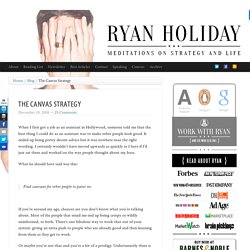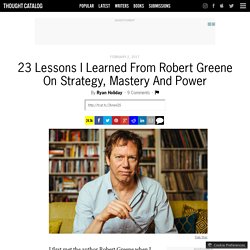

The Canvas Strategy. When I first got a job as an assistant in Hollywood, someone told me that the best thing I could do as an assistant was to make other people look good.

It ended up being pretty decent advice but it was nowhere near the right wording. I certainly wouldn’t have moved upwards as quickly as I have if I’d just sat there and worked on the way people thought about my boss. What he should have said was this: Find canvases for other people to paint on. If you’re around my age, chances are you don’t know what you’re talking about. 23 Lessons I Learned From Robert Greene On Strategy, Mastery And Power. I first met the author Robert Greene when I was a sophomore in college.

A few weeks after that meeting, I was not a sophomore anymore. In fact, I was no longer in college. Last month, I wrote of a few of the lessons I’d received in the last ten years from another author, Tim Ferriss. As essential as the things I’ve learned from Tim were, they pale in comparison to what I’ve learned from Robert—a man who has shaped my career and my worldview. His books alone—The 48 Laws of Power, The Art of Seduction, 33 Strategies of War, The 50th Law, Mastery—would have been enough to change my life.
Video Essay: A Briefer History of Time. Screw motivation, what you need is discipline. If you want to get anything done, there are two basic ways to get yourself to do it.

The first, more popular and devastatingly wrong option is to try to motivate yourself. The second, somewhat unpopular and entirely correct choice is to cultivate discipline. FZDSCHOOL. Untitled. Video editing 101. Creativity. 7 Simple Steps to a Stress-Free Career. How to Leave Your Ego at the Door. The 7 Things Successful People Never Say. The Science Behind "Having a Bad Day" (and how to solve it) Update: This article was republished on Lifehacker on July 26, 2010.

Sometimes you wake up, and within the first hour or so, you know it’s going to be a bad day. It happened to me a couple days ago, and it happened to my girlfriend just this morning. So I’d like to take this opportunity to go on the record saying this entire notion of having a “bad day” is bullshit! Don’t worry, this is not a rant, there’s real science behind it. The Science Behind "Having a Bad Day" (and how to solve it) 12 Things You Are Doing To Sabotage Your Future. I have mentored, counseled, encouraged, discouraged, hired and fired hundreds of people over the past 25 years.

Oftentimes failure is less about a lack of talent or ability, and more about self sabotage. These are frequent road blocks I see in people, myself included. 1. 5 Ways to Do Nothing and Become More Productive. Reduce Your Stress in Two Minutes a Day – Harvard Business Review. Bill Rielly had it all: a degree from West Point, an executive position at Microsoft, strong faith, a great family life, and plenty of money.

He even got along well with his in-laws! So why did he have so much stress and anxiety that he could barely sleep at night? I have worked with Bill for several years now and we both believe his experience could be useful for other capable, driven individuals. At one time, no level of success seemed enough for Bill. He learned at West Point that the way to solve problems was to persevere through any pain. Live Happier: Ten Things to Stop Doing Right Now. Nine Things Successful People Do Differently - Heidi Grant Halvorson. Learn more about the science of success with Heidi Grant Halvorson’s HBR Single, based on this blog post.

Why have you been so successful in reaching some of your goals, but not others? If you aren’t sure, you are far from alone in your confusion. It turns out that even brilliant, highly accomplished people are pretty lousy when it comes to understanding why they succeed or fail. The intuitive answer — that you are born predisposed to certain talents and lacking in others — is really just one small piece of the puzzle. In fact, decades of research on achievement suggests that successful people reach their goals not simply because of who they are, but more often because of what they do. 10 Creative Rituals You Should Steal. Benjamin Franklin made sure to end every day by asking “What good have I done today?”

Maya Angelou only wrote in tiny hotel rooms. Jack Kerouac made sure to touch the ground nine times before writing. What to Do When You Fall Back Into Your Old, Less Productive Ways. What happens after you’ve tried a new productivity routine for a few hours, a day, or even a week only to then find yourself seemingly right back where you started?

Do you give up? Or try once more with renewed determination to make the habit stick? Fix Bad Habits: Insights from a 7-Year Obsession. We all have lousy habits.

Things we’d like to do, or know we should, but just don’t seem to happen: exercise, diet, productivity or flossing longer than a week after the visit to the dentist. In that sense, I’m like most people – still a work in progress.But, unlike most people, I’ve had on ongoing obsession with figuring out how to fix those lousy habits. I’ve spent thousands of hours being an experimental guinea pig, uncovering surprising findings, such as: Implementing a daily exercise plan is easier than exercising 3 times per weekChanging 10 meals will change 90% of your eating habitsLearning a new skill or language can be accomplished with 5 minutes a day I don’t expect most people to replicate my, perhaps unhealthy, obsession with self-experimentation.
Hacking Habits: How To Make New Behaviors Last For Good. In the workplace and in life, we are little more than the sum of our habits. Who we are and what we accomplish depends largely on a vast network of routines and behaviors that we carry out with little to no thought whatsoever. As neuroscientist David Eagleman writes in Incognito, “Brains are in the business of gathering information and steering behavior appropriately.
It doesn’t matter whether consciousness is involved in the decision making. And most of the time, it’s not.” “The Ostrich Problem” and The Danger of Not Tracking Your Progress. Say you’re working on a new book. Or undertaking a new exercise routine. Perhaps you haven’t been keeping tabs on how many words you’ve written, or weight lost. New Habit? Set a Schedule, Not a Deadline. Designed by Dmitry Baranovskiy for the Noun Project The creative routines of famous creatives has been popular internet fodder this year. The Pacific Standard thinks this obsession and trend of emulating famous artist’s habits is problematic, to say the least.
The larger picture, says Casey N. Cep, is that most artists did not always followed these routines they’re known for anyways. In the end they would have still produced genius work regardless of the kind of breakfast they ate, hours they worked, or whatever office supplies they used. View on success/failure. 5 Scientific Ways to Build Habits That Stick. “We are what we repeatedly do. Excellence then, is not an act, but a habit.” Sobering words from Aristotle, and an astute reminder that success doesn’t come overnight. On the contrary, it’s discipline that gets you from Point A to the often elusive Point B. In our day-to-day lives, habits can often be tough to build, as there are plenty of distractions that can lead us off the “straight and narrow” and right back to our old ways. To alleviate some of those troubles we can examine some academic research on motivation, discipline, and habit building, and break down their findings into actionable steps that any aspiring habit-builder can put into place.
5 Scientific Ways to Build Habits That Stick. The Habits Of Supremely Happy People. Martin Seligman, the father of positive psychology, theorizes that while 60 percent of happiness is determined by our genetics and environment, the remaining 40 percent is up to us. In his 2004 Ted Talk, Seligman describes three different kinds of happy lives: The pleasant life, in which you fill your life with as many pleasures as you can, the life of engagement, where you find a life in your work, parenting, love and leisure and the meaningful life, which “consists of knowing what your highest strengths are, and using them to belong to and in the service of something larger than you are.”
After exploring what accounts for ultimate satisfaction, Seligman says he was surprised. The pursuit of pleasure, research determined, has hardly any contribution to a lasting fulfillment. Eat That Frog - Brian_Tracy_Eat_That_Frog.pdf. 5 Leadership Behaviors Loyal Employees Trust. 5 Morning Rituals to Keep You Productive All Day Long. How to be good at anything. Good Work vs. Great Work (And How to Tell Which is Which)
How to feel empowered.